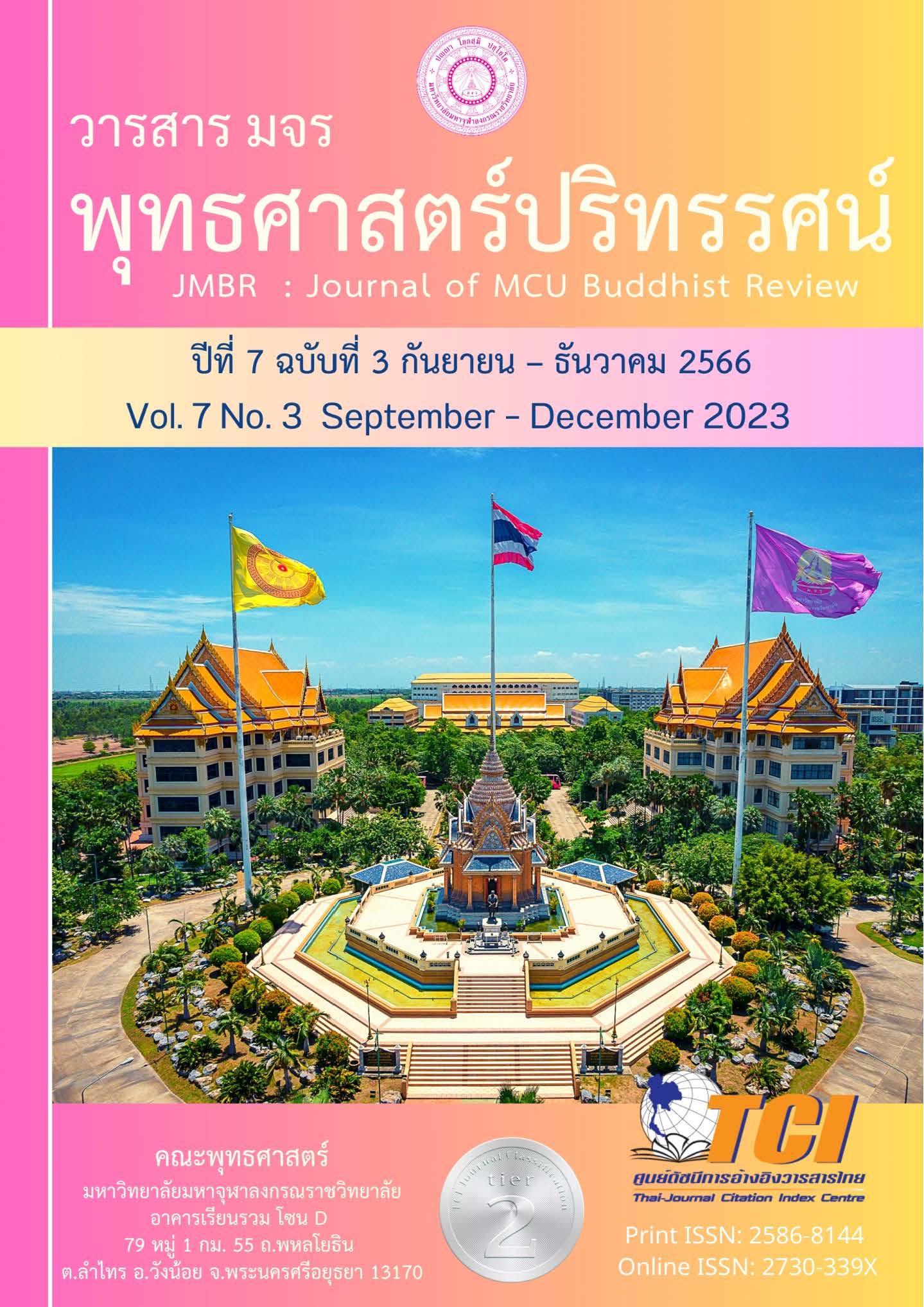การศึกษาเปรียบเทียบหลักจริยธรรมเพื่อการอยู่ร่วมกันอย่างสันติ ในพระพุทธศาสนากับศาสนาขงจื่อ
Main Article Content
บทคัดย่อ
บทความวิจัยนี้มีวัตถุประสงค์ 1) เพื่อศึกษาหลักจริยธรรมเพื่อการอยู่ร่วมกันอย่างสันติในพระพุทธศาสนา 2) เพื่อศึกษาหลักจริยธรรมเพื่อการอยู่ร่วมกันอย่างสันติในศาสนาขงจื่อ และ 3) เพื่อเปรียบเทียบหลักจริยธรรมเพื่อการอยู่ร่วมกันอย่างสันติในพระพุทธศาสนากับศาสนาขงจื่อ บทความนี้เป็นการศึกษาเชิงเอกสาร โดยศึกษาและรวบรวมข้อมูลจากพระไตรปิฎก คัมภีร์หลุนอวี่ และงานวิจัยที่เกี่ยวข้อง วิเคราะห์และนำเสนอผลการวิจัยเชิงพรรณนา
ผลการศึกษาพบว่า 1) จริยธรรมในศาสนาจึงเป็นการวางกรอบให้มนุษย์ประพฤติปฏิบัติ เพื่อการทำงานร่วมกันอย่างสงบสุข และมีจุดหมายที่ดีในสัมปรายภพ โดยมีเป้าหมายเพื่อพัฒนาคุณภาพชีวิตเริ่มต้นจากการพัฒนาจริยธรรมเป็นอันดับแรก เพื่อทำให้คนมีคุณธรรม ไม่สร้างปัญหาให้กับตนเองและสังคม ซึ่งต้องอาศัยหลักพรหมวิหารธรรม สังคหวัตถุ และสาราณียธรรม 2) หลักจริยธรรมเพื่อการอยู่ร่วมกันอย่างสันติในศาสนาขงจื่อ คือการปฏิบัติตนด้วยการสัมพันธภาพอันดีระหว่างบุคคล เพื่อก่อให้เกิดความร่วมมือร่วมใจให้อันจะทำงานอย่างใดอย่างหนึ่งให้สัมฤทธิ์ผลอย่างมีคุณภาพ และประสิทธิภาพ อันจะก่อให้เกิดประโยชน์สุขทั้งแก่ตนเองและผู้อื่น ตามหลักแห่งหน้าที่ และเมตตาธรรม 3) การอยู่ร่วมกันอย่างสันติตามหลักจริยธรรมทั้งสองศาสนาคือการต้องการให้สังคมมีการอยู่ร่วมกันโดยไม่ความขัดแย้ง ไม่สร้างภาระหรือปัญหาให้เกิดแก่สังคม โดยต้องมีคุณธรรม จริยธรรมเป็นส่วนประกอบ ส่วนในประเด็นที่ต่างกันนั้น พระพุทธศาสนาเน้นในการพัฒนาตนให้สมบูรณ์แบบแล้วขยายผลสู่สังคมโดยอาศัยหลักธรรมทางพระพุทธศาสนาเป็นเครื่องมือ เช่น พรหมวิหาร และสังคหวัตถุเป็นต้น ส่วนศาสนาขงจื่อ มีเป้าหมายเพื่อก่อให้เกิดการพัฒนาสังคมและการเมือง และเสนอแนวทางพัฒนาคนให้สมบูรณ์ตามหน้าที่
Article Details

อนุญาตภายใต้เงื่อนไข Creative Commons Attribution-NonCommercial-NoDerivatives 4.0 International License.
- บทความที่ได้รับการตีพิมพ์เป็นลิขสิทธิ์ของวารสาร มจร พุทธศาสตร์ปริทรรศน์
- ข้อความใดๆ ที่ปรากฎในบทความที่ได้รับการตีพิมพ์ในวารสาร ถือเป็นความรับผิดชอบของผู้เขียนบทความ และข้อคิดเห็นนั้นไม่ถือว่าเป็นทัศนะและความรับผิดชอบของกองบรรณาธิการวารสาร มจร พุทธศาสตร์ปริทรรศน์
เอกสารอ้างอิง
ขงจื่อ. (2562). หลุนอี่ว์: ขงจื่อสนทนา. แปลโดย สุวรรณา สถาอานันท์. กรุงเทพฯ: โอเพ่น โซไซตี้.
ชัยวัฒน์ อัตพัฒน์. (2520). จริยศาสตร์. กรุงเทพฯ: ภาควิชาปรัชญา คณะมนุษยศาสตร์ มหาวิทยาลัยรามคำแหง.
พระครูโอภาสสราธิคุณ อาสโภ (โหมดศิริ). (2554). การศึกษาเปรียบเทียบแนวคิดเรื่องหน้าที่ของขงจื๊อกับแนวคิดเรื่องหน้าที่ของพุทธปรัชญาเถรวาท. วิทยานิพนธ์พุทธศาสตรมหาบัณฑิต บัณฑิตวิทยาลัย: มหาวิทยาลัยมหาจุฬาลงกรณราชวิทยาลัย.
พระมหาไฉน ประกอบผล. (2544). การศึกษาหลักพุทธจริยธรรมเรื่องหน้าที่ของบุตรธิดาต่อบิดามารดากรณีศึกษา: นักเรียนโรงเรียนปากเกร็ดจังหวัดนนทบุรี. วิทยานิพนธ์อักษรศาสตรมหาบัณฑิต บัณฑิตวิทยาลัย: มหาวิทยาลัยมหิดล.
พระมหาบุญเรือง ปญฺญาวชิโร. (2541). การศึกษาแนวความคิดเรื่องมนุษยนิยมในปรัชญาขงจื๊อ. วิทยานิพนธ์พุทธศาสตรมหาบัณฑิต บัณฑิตวิทยาลัย: มหาวิทยาลัยมหาจุฬาลงกรณราชวิทยาลัย.
พระพรหมคุณาภรณ์ (ป.อ.ปยุตฺโต).(2550). การพัฒนาที่ยั่งยืน. พิมพ์ครั้งที่ ๖. กรุงเทพมหานค: สหธรรมิก.
มหาจุฬาลงกรณราชวิทยาลัย. (2539). พระไตรปิฎกภาษาไทย ฉบับมหาจุฬาลงกรณราชวิทยาลัย เล่มที่ 22, 25. กรุงเทพฯ: โรงพิมพ์มหาจุฬาลงกรณราชวิทยาลัย.
สุวรรณา สถาอานันท์. (2556). กระแสธารปรัชญาจีน: ข้อโต้แย้งเรื่องธรรมชาติ อำนาจและจารีต. พิมพ์ครั้งที่ 4. กรุงเทพฯ: สยามปริทัศน์.


